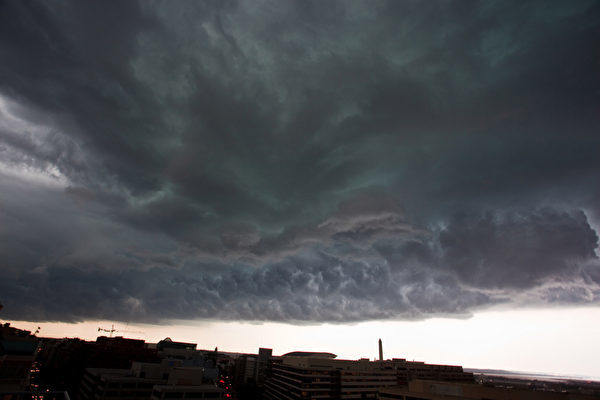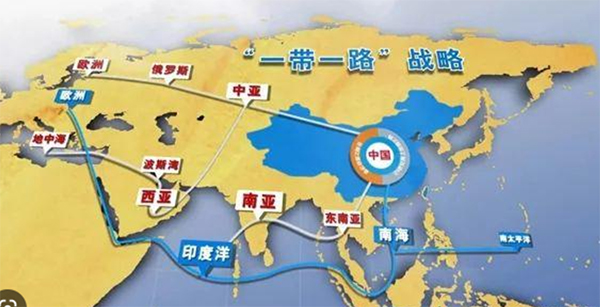The Chinese Communist Party (CCP) is deeply mired in debt, with its money-grabbing efforts continuing unabated. Its collapse may not be far off. (Jeff Nenarella/Dajiyuan)
[People News] Is it a coincidence, or providence? Theists and atheists may draw different conclusions. Let’s look at two more examples:
On February 6, 2025, then–Thai Prime Minister Paetongtarn Shinawatra visited Beijing and fawned over the regime, saying, “I too have Chinese blood.” On February 28, Thailand reportedly deported 40 Uyghurs fleeing CCP persecution. Then, on March 28, the National Audit Office building under construction in Bangkok—with Chinese state-owned companies participating—collapsed due to an earthquake in Myanmar, killing 92, injuring 33, and leaving many missing. On August 29, Paetongtarn was removed from office by Thailand’s Constitutional Court.
Another case is Nepalese Prime Minister Oli, who rushed to Beijing to flatter the CCP during the September 3 military parade and had also attended the Shanghai Cooperation Organisation summit in Tianjin. Oli had gushed that the parade was “an extraordinary event.” Perhaps he envied and wanted to imitate the CCP’s ability to block information and even harvest citizens’ organs to prolong life. Yet as soon as he implemented an internet blockade back home, he was ousted by the people. Today, his whereabouts are unknown, and his residence was burned to the ground.
Having finished talking about abroad, let’s talk about the domestic situation.
Inside China, the economy is on the brink of collapse, unemployment is surging, corruption is rampant, public morale has disintegrated, youth embrace “lying flat,” resentment toward the rich is everywhere, natural and man-made disasters occur frequently, and even the CCP’s 100 million members no longer truly believe in the Party. Infighting plagues both the Party and the military, while over 450 million people have publicly declared their withdrawal from the CCP and its affiliated organisations through The Epoch Times. No amount of violent repression can reverse this.
Can more summits like the SCO or “Gold Brick” forums, more lavish handouts abroad, more military parades, or stoking nationalism help? Aside from annoying the public and fueling further discontent, they are useless.
In short, the CCP is being abandoned and condemned by heaven, earth, and humanity. And now, with the collapse of Nepal’s Communist regime—where even the CCP headquarters building and portraits of Xi Jinping inside were set on fire—Beijing has even more reason to fear.
Can the CCP not be afraid? Of course, it’s afraid.
Nepal is calling for dialogue and political negotiation to resolve the crisis. The CCP naturally wants to intervene and install another pro-Beijing government. But is that still possible? The CCP knows it isn’t. The protest group organising a transitional government, “Nepal’s Gen Z,” is explicitly anti-Communist. Balendra Shah, the independent mayor of Kathmandu, could become interim leader. He is acceptable to the Gen Z activists.
Can the CCP not be terrified? Of course, it is trembling with fear.
Mainland Chinese society has long been ready to abandon the Party. This is clear from the public’s attention to Nepal’s upheaval. On September 10, related hashtags shot to the top of search rankings. Netizens commented: “When will such good fortune come to us?” “Copy their homework quickly!” Others said: “I see the Big Underpants (CCTV headquarters building) on fire.”
Other online remarks included: “This is what happens when you cosy up to Xi Jinping.” “Post-parade effect?” “Most likely, he’s escaped to Beijing to settle accounts.” “The next to fall is the CCP—it’s only a matter of time.”
Many netizens spoke more directly: “We’ve long been utterly disgusted with the CCP.” They pointed out that during the military parade, Putin and Xi discussed using transplanted organs to prolong their lives—proof that not only does Xi know about the organ harvesting of Chinese citizens, but foreign leaders also know, and the CCP may even be using citizens’ organs to bribe foreign dignitaries. No wonder so many Chinese schoolchildren go missing. Teachers and doctors—once considered noble professions—have now become accomplices in organ harvesting. Communism, it turns out, includes sharing citizens’ organs among the elite. How can such a demonic party endure?
Some argue that, unlike Nepal, China’s protests cannot succeed because the CCP can deploy the army. But more people believe that everything depends on public awakening: if the people’s hearts no longer belong to the CCP, the regime will have no answer.
Mainland scholar Tian Ning (alias) told Dajiyuan that Nepal’s regime collapse shows that the global tide of freedom, democracy, and human rights is irreversible, and the CCP cannot escape eventual disintegration. He urged Chinese citizens to resist through non-cooperation: refusing to invest in the stock market, holding on to their money, and undermining the CCP’s foundations through passive resistance. He stressed that sudden Nepal-like events could erupt in China too, sparking nationwide protests. “Isn’t it already true that more and more people dare to curse the CCP and Xi Jinping (‘200 jin’) semi-openly?” he said.
Commentator Xiao Shuojia noted: “Xi Jinping’s regime may look stable, but in reality, he’s sitting on a volcano. China is riddled with contradictions, and another incident like Jiangyou could trigger nationwide protests to topple the Party. The Chinese people have learned that the power of the masses can ultimately determine the fate of any political party. Once the people rise up against one-party dictatorship and tyranny, the CCP will crumble at once.”
Independent commentator Cai Shenkun said the Nepal events should inspire Chinese netizens: “When facing totalitarian rule, the people must rethink their strategies. What methods can spark larger protests? What tactics can ensure police and soldiers won’t participate in repression? Once a dictatorship loses the support of police and the military, its regime can collapse very easily.”
Can the CCP not be afraid? It is certainly trembling, debating daily how to respond. Up to now, Beijing has remained silent about Nepal’s Communist collapse—unable to issue any statement without embarrassing itself.
In truth, heaven has given the CCP chances before: it nearly collapsed at the end of the Cultural Revolution, came close to democratisation after 1989, and even when Xi Jinping first came to power and arrested Jiang faction villains like Zhou Yongkang. Unfortunately, Xi later turned to preserving the Party at all costs, leading to today’s situation where hostile voices surround him from all directions. As the online saying goes: “He could have handled things with calm and ease, but instead now he’s left rushing, stumbling, and tumbling along.”
(First published by People News)











News magazine bootstrap themes!
I like this themes, fast loading and look profesional
Thank you Carlos!
You're welcome!
Please support me with give positive rating!
Yes Sure!